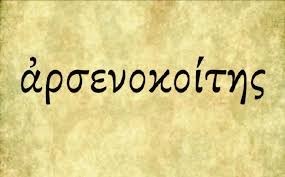Raboyseyee and Ladies,
Sinful Thoughts and Sins:
Just last week on Jeopardy’s ‘Tournament of Champions,’ the clue provided for the final jeopardy question was this: “This book is named for a tribe of Israel that carried out judgment of the idolaters of the golden calf.” The answer -of course in the form of a question- was Leviticus and all three contestants answered correctly. So happens that earlier today, the Ois asked this question to a rather learned individual: He did not answer correctly.

The third sefer (book) of the heylige Toirah, known in Hebrew as Vayikra (after the first word of the text, which means “and He called”), is also called Toiras Kohanim, the Teaching of Priests. So says the heylige Gemora (Megillah 30b) because so many of its laws revolve around the service and lifestyle of the kohanim who are all descendants of Aharoin, the first ever priest. Why the book is called Leviticus, ver veyst? Says the Chizkuni that Sefer Vayikra is also called Leviticus since all the kohanim descended from the Tribe of Levi, which contains the word “Levi.” Gishmak! The bottom line: its English name was given by the Greeks. Another bottom-line question is this? Why do we study this book? Or, at least the first number of parshas which are deliciated solely to animal -and other-sacrifices? By other we mean birds and even flower.
As we begin the Ois’s review of Sefer Vayikra -for the 14th time- we are overwhelmed by the intricate detail with which the heylige Toirah describes the procedures of bringing korbonis (sacrifices). As a result, we typically tune out, daydream, wish we had sinned so that we could bring a korban, fall asleep, talk during laining, read handouts, stare at the ezras-noshim (ladies’ section), skip shul altogether, or make kiddush much earlier. Why? Because we can’t relate and even the koihanim -and this was their business, their bread and butter- are bored stiff. Being stiff in the wrong place at the wrong time and with the wrong person, if you chap, will certainly qualify one to bring one or more of the sacrifices detailed in our parsha.
That being said, the bottom line is this: Korbonois are long dead and gone. As the Ois has said many times over the years, their comeback is questionable. Once again, we will need either Eliyahu or the Moshiach himself to give us the right answer.
Oib azoy (that being the case), why do we need to learn about korbonis? Why not skip this parsha (and next week’s as well)? Ver veyst? Ober the emes is that korbonis mamish follow where Sefer Shmois left off, whatever that means. What does it mean? For the greater part of Sefer Shmois, Moishe was exhorting Paroy to let the Yiddin leave his country. Moishe kept hammering away the RBSO’s message: “Release My people and they will serve Me.” Shoin, finally they were free and we’re about to find out that ‘serve Me’ meant through korbonis, animal sacrifices in the Beis Hamikdash.
And why were we to bring korbonis in the first place? Nu, a unified answer is hard to come by, ober here is what a few had to say. Said the Ramban (Vayikra 1:9) quoting the RambaM in Moireh Nevuchim azoy: the RBSO gave us korbonis because animal sacrifice was absolutely necessary for the Yiddin! It was? Seemingly, they needed a physical method of worship. Why? Davka because having been a part of the pagan culture in Mitzrayim and other such places along the way, they could not easily be weaned off. In other words: the Yiddin of previous generations -with the exception of a few good men and zicher also women- were pagan worshippers; oy vey! And yet the RBSO chose them? To battle and rectify this now engrained avoido zoro worship, the Yiddin were now directed and commanded to do a similar action. Going forward, these rituals would be for a sacred purpose. Same action, different purpose and mindset. Psychologists must have something to say about that. Gishmak! Let’s read that one more time. Sacrifices were seemingly only implemented in order to imitate the foreign style of worship the Yiddin had become accustomed to while in enslaved? Well, blow me down! Korbonis were instituted in a familiar manner. And says the RambaM (Moireh Nevuchim 3:46) this bombshell: Since animal sacrifices are no longer a feature of daily religious worship in most of the world, it is conceivable to suggest that the RBSO will do away with sacrifices when the Moshiach arrives. OMG! And yet we’re about to embark on a journey through Sefer Vayikra (the book of Leviticus)?
Nu, you can only imagine how well that went over with the kohanim who saw this as a threat to their entire future business opportunity in the messianic age. In fact, many Kohanim feel that they are preparing for the arrival of Moshiach by learning the halochos (laws) of the avoidah (temple service) in the Beis Hamikdash so that they will be ready for resumption of their priestly duties in the Third Temple. Of course, nobody is really sure whether all of the sacrifices will resume. A few? Or none? Others, including the RambaN (Vayikra 1:9) weren’t too happy either and disagree with the RambaM’s hypothesis vehemently.
Says he, korbonis can atone for our sins. They do? How does that work? Let’s check out two of the sacrifices described in our parsha.
As mentioned over the years, the korban oilah was designated for those who had sinful thoughts; who among us, hasn’t? In fact, most have those daily, if not hourly. And taka says the Medrish (Vayikra Rabba 7:3): the korban oilah is brought to atone for, among other things, sinful thoughts. Bad thoughts that went without follow up action. In cases where action was taken, the RBSO designated other types of sacrifices. Ober, are sinful thoughts all that giferlich? Isn’t that what the yetzer horo’s job is? Isn’t that his tafkid (mandate)? And aren’t we rewarded for overcoming sinful thoughts? Why would one need to bring a sacrifice for sinful thoughts? And if that’s taka the case, one can easily chap how the oilah and the korban chatos, the sin offering for real sinners, were the two most popular of all.

Moreover, how are we to reconcile that medrish with the heylige Gemora which says quite the opposite? Says the heylige Gemora (Kiddushin 40a) azoy: “machashovo-ro’oh- eyn-hakodosh-baruch-hu-metzarf- ala’mayseh. In plain English, the RBSO does not deem the sinful thought an action.” What a relief! Very good, in fact, givaldige news for most of you; the RBSO only punishes sinful acts, but not sinful thoughts that do not result in a sinful act (the only exception being the sin of avoida-zoro; He abhors that). Ober still we ask, why would a thought require a korban and if it does, wouldn’t most people go bankrupt bringing this particular sacrifice daily?
And the bottom line: who says everything has to be reconciled? Is your checkbook reconciled? Do you reconcile your good deeds against your very bad ones? Certainly we hope that the RBSO understands human frailty; He did, after all, create us with a yetzer horo who does his job well. He did program us to be bad. That being said, so long as we don’t act upon our sinful thoughts the RBSO will typically not hold us accountable. Moreover, if sinful thoughts remain but those, whom have we hurt except ourselves? And, sinful thoughts can enhance our pleasure, if you chap, and help us get by. The emes is this: many of you are having sinful thoughts even as you are performing a mitzvah. Of course, you chap.
Ober does everyone agree? Not! It so happens that the Marsho and the Meiri argue over this very topic. Is a person held accountable for sinful thoughts he did not carry out because he was prevented from doing so? In other words: what happens if you had sinful thoughts, were in fact eager to carry them out, but somehow, something got in your way and you couldn’t execute the plan? What’s pshat? Nu, let’s say you ogled your chaver’s eishes chayil (wife); you mamish wanted to do giferliche things with, and to her. Ober, she said no! A better example: You were prevented from acting out because of circumstances beyond your control. Let’s say you got pulled over on your way or had a flat tire, if you chap. Taka nothing happened, ober are you held accountable for the bad thoughts? Are sinful but non-actionable thoughts, not executed because of circumstances beyond your control, still only thoughts? Or, are they considered actions and would require greater levels of atonement, if at all even possible? Ver veyst?
Ober raboyseyee, it appears that your sinful thoughts contain the seed for sinful actions. Nu, it’s still better than discharging your seed -mamish- with those thoughts, if you chap. Such sinful thoughts could avada lead to sinful acts that include real seeding, if you chap. What to do?

We can now understand why a person who has sinful thoughts, while not facing divine punishment, must still bring a korban Oilah. The idea is that by going through the exertion and expense of bringing a korban -animals are not cheap, especially when bought daily- the sinner will focus on the great upheaval caused by his sinful thoughts. He will feel regret for the sinful thought and commit to elevate his thoughts in the future. In other words: actions affect one’s attitude towards his/her thoughts. The bottom line: Sinful thoughts are not something to be lightly dismissed. Seemingly the korban Oilah is meant to compel the sinner to engage in a time-consuming and complex procedure that will reinforce within him the evil nature of his act and thereby hopefully cause him to refrain from repeating it in the future. Does this work?
In reality, of course not! People have sinful thoughts kimat every hour of every day. And maybe it’s taka the case that with the coming of the Moshiach, the yezter hora will be kaput, over and done. And so will the need for a korban Oilah, its relevance gone.
Veyter, and let’s briefly discuss the chatos offering, the one brought when one did indeed sin, albeit perhaps not intentionally.
Says the heylige Toirah (Vayikra 4:2),
דַּבֵּ֞ר אֶל־בְּנֵ֣י יִשְׂרָאֵל֮ לֵאמֹר֒ נֶ֗פֶשׁ כִּֽי־תֶחֱטָ֤א בִשְׁגָגָה֙ מִכֹּל֙ מִצְוֺ֣ת יְהֹוָ֔ה אֲשֶׁ֖ר לֹ֣א תֵעָשֶׂ֑ינָה וְעָשָׂ֕ה מֵאַחַ֖ת מֵהֵֽנָּה׃
Speak to the Israelite people thus: When a person unwittingly incurs guilt in regard to any of יהוs commandments about things not to be done, and does one of them—
The korban chatas (sin offering) was the sacrifice brought after accidentally committing a sin that, had it been committed intentionally, would be subject to the penalty of korase (spiritual excision). How does that work? Inadvertent sin is a direct result of having allowed one’s animalistic tendencies to get out of hand- sometimes in hand as well, if you chap- for things that a person does without thinking and typically reflect that in which he is immersed, and where his true pleasure lies. The bottom line: The actions of a truly holy individual – even the unintentional ones – are good and holy; succumbing to evil – even inadvertently – is an indication that a person does not find his pleasure in goodness alone; such is the real world.
The purpose of the chatas sacrifice was not to pay the RBSO back for what was done. Were that case, the RBSO would have offered us the ability to bring sin offerings for those who sinned on purpose as well. Intentional sinners are dealt with differently. That for another day. Seemingly, the goal of the chatas was to draw us closer to the RBSO, to bring us into His presence. The bottom line: when we sin, it usually means that we forgot about Him, the RBSO. We had a temporary lapse in judgement. The RBSO knows we mean well, that we want to be good. He also knows that we sometimes forget about Him and mess up, unintentionally. The sin offering was the RBSO’s way of letting us know that all is good despite the laps.
Most sin offerings – read more below- are violations of negative mitzvis, the loi-sah-says, the ones most of us have trouble observing properly. In plain English: one is/was not required to bring a sacrifice -not this one for sure- were the person -male or female- to violate a mitzvas ah-say, a positive commandment. And says the heylige Gemora (Makis 13B), azoy: the unintentional blasphemer also does not bring a korban chatas because his sin was verbal rather than physical. The sin offeror must have violated physically. And for that reason, raboyseyee, we can chap, why this station was busy all day and night.

Who did bring the chatas offering? Seemingly many! Why taka did so many do the wrong thing? Says the heylige Gemora (Soitah 3A), azoy: A person does not sin unless a spirit of insanity enters into him. The bottom line: the temporary insanity defense has some merit. In other words, we get momentarily careless. We get caught up in feelings of the moment without thinking and shoin. A minute or two later, we are in chatos land, and obligated because we sinned unintentionally. We, momentarily forgot the RBSO’s heylige Toirah and His commandments. We were thinking about ourselves only and more typically, about ourselves and a few select others, if you chap, and just like that, we violated.
Which sins qualified for the chatas? All told, there were 43 sins for which one might bring the standard korban chatas. The great majority of the list -a full 23- are in the arayis family (forbidden sexual relationships). 17 are for other sins. Now we chap why the Mizbayach was busy 24 hours a day and the kohanim so fat. A complete list of the 43 sins can be found in Mishneh Toirah Hilchos Shegagos 4:1.
How did the sacrifice work? And its purpose? We are taught that the reason for this offering was to cultivate the proper emotions in a person. The violator was to consider himself deserving of such treatment -being killed- and that it was only through the RBSO’s never-ending mercy- that he may bring an animal in his place. He was to feel humbled through his offering and by such reflection, would be motivated to take greater caution in his future actions. Were there repeat offenders? No doubt about it and had many of us been around then, we’d be on line daily. Such is real life.
A gitten Shabbis and a freylichen (happy) Purim wherever you find yourselves.
The Heylige Oisvorfer Ruv
Yitz Grossman
